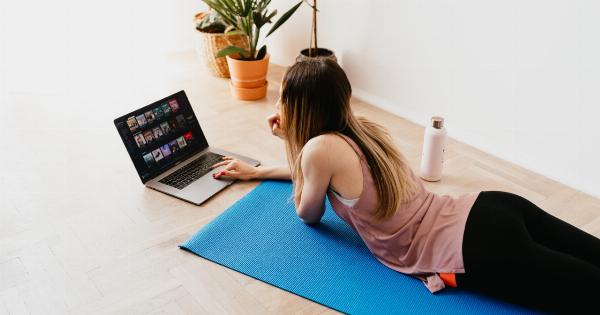Regular physical exercise has been proven to have numerous benefits for overall health and well-being.
Not only does exercise help in maintaining a healthy weight, it also improves cardiovascular health, boosts mood, and reduces the risk of chronic diseases. Another crucial aspect of a healthy lifestyle is getting enough restful sleep. Adequate sleep is essential for proper functioning of the body and mind, but many people struggle with sleep-related issues.
However, did you know that there is a strong link between exercise and restful sleep? In this article, we explore the relationship between exercise and getting a good night’s sleep.
The Importance of Sleep
Before we delve into the relationship between exercise and sleep, it is essential to understand why getting enough quality sleep is crucial for our health. Sleep is the body’s way of rejuvenating and repairing itself.
During sleep, various processes take place, such as muscle and tissue repair, hormone regulation, memory consolidation, and immune system strengthening. Without sufficient sleep, these essential processes become compromised, leading to weakened physical and mental health.
The Role of Exercise in Sleep Quality
Exercise plays a significant role in improving the quality of sleep. Engaging in regular physical activity promotes the release of endorphins, also known as “feel-good” hormones, which reduce stress and anxiety.
When stress and anxiety levels are lowered, falling asleep becomes easier, and sleep quality is enhanced.
Furthermore, exercise has been shown to regulate and improve the body’s circadian rhythm, the internal biological clock that governs the sleep-wake cycle.
Regular physical activity helps to establish a consistent sleep schedule, making it easier to fall asleep and wake up at the desired times. It also promotes deeper and more restorative sleep, allowing the body to fully recharge.
The Timing of Exercise for Optimal Sleep
The timing of exercise can significantly impact sleep quality. While any form of physical activity is beneficial, exercising too close to bedtime can have a stimulating effect on the body, making it harder to fall asleep.
It is generally recommended to finish exercising at least three hours before bedtime to allow the body to cool down and for the stimulating effects to wear off.
That being said, everyone is different, and some people may find that exercising closer to bedtime doesn’t have a negative impact on their sleep. It is essential to listen to your body and gauge how exercise timing affects your own sleep patterns.
If you notice that late-night workouts are causing sleep disruptions, consider adjusting your exercise routine to earlier in the day.
The Benefits of Different Types of Exercise on Sleep
Various types of exercise can have different effects on sleep quality. Let’s explore the benefits of different types of physical activity:.
1. Aerobic Exercise
Aerobic exercises such as walking, running, swimming, or cycling, have been shown to have a particularly positive impact on sleep.
These activities increase the heart rate, promote oxygenation, and release endorphins, resulting in improved sleep quality. Aerobic exercise earlier in the day is especially beneficial for insomnia sufferers as it helps to reduce anxiety and promote relaxation in the evening.
2. Strength Training
Strength training exercises, including weightlifting and resistance training, also contribute to better sleep. By building strength and muscle mass, these activities improve overall physical health and have a positive impact on sleep quality.
Strength training is best done earlier in the day or at least a few hours before bedtime to allow ample time for the body to recover and wind down before sleep.
3. Yoga and Stretching
Yoga and stretching exercises are known for their ability to promote relaxation and reduce stress. By incorporating deep breathing and gentle movements, yoga and stretching help calm the mind and prepare the body for restful sleep.
These activities are particularly useful in the evening or as part of a pre-bedtime routine to signal the body that it’s time to unwind and prepare for sleep.
4. Mind-Body Exercises
Mind-body exercises such as tai chi and qigong focus on the integration of physical movement, mental focus, and deep breathing. These gentle exercises help reduce stress, improve mindfulness, and enhance sleep quality.
Incorporating mind-body exercises into a daily routine, particularly in the evening, can help promote relaxation and set the stage for a restful night’s sleep.
Tips for Incorporating Exercise into Your Sleep Routine
To maximize the benefits of exercise on sleep quality, consider the following tips:.
1. Set Realistic Goals
Start by setting realistic exercise goals that are attainable and sustainable.
Gradually increase the duration and intensity of your workouts over time, aiming for at least 150 minutes of moderate-intensity aerobic exercise or 75 minutes of vigorous-intensity exercise per week, as recommended by the World Health Organization.
2. Create a Consistent Exercise Schedule
Establishing a consistent exercise schedule helps regulate your body’s internal clock and promotes better sleep. Choose a time that works best for you and make it a priority to exercise at the same time each day.
Consistency is key to reaping the benefits of exercise on sleep.
3. Find Activities You Enjoy
Engage in physical activities that you genuinely enjoy. The more you enjoy the exercise, the more likely you are to stick with it in the long term.
Whether it’s dancing, hiking, playing a sport, or practicing martial arts, find activities that bring you joy and make exercise a fun part of your daily routine.
4. Create a Relaxing Bedtime Routine
In addition to incorporating exercise, creating a relaxing bedtime routine can further enhance sleep quality. Wind down before bed by engaging in calming activities such as reading a book, taking a warm bath, or practicing relaxation techniques.
Avoid stimulating activities, bright screens, and heavy meals close to bedtime.
5. Listen to Your Body
Pay attention to how your body responds to different exercise routines and adjust accordingly. If you find that certain types of exercise or workout times negatively impact your sleep, make necessary modifications.
Everyone is unique, and it’s important to find what works best for your individual needs.
Conclusion
The relationship between exercise and restful sleep is undeniable. Regular physical activity, particularly aerobic exercises, helps reduce stress, promote relaxation, and regulate the sleep-wake cycle.
By incorporating exercise into your daily routine and adopting healthy sleep habits, you can significantly improve the quality of your sleep and enhance your overall well-being.































